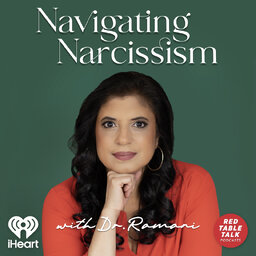Moving Through Generational Trauma - Part 2
In Part 2 of our Guest's episode, they dive in deeper about their childhood, and how their Father's treatment affected both them and their sibling. We also explore how their abusive upbringing shaped them as a parent, and the steps they took to right their own wrongs while continuing to navigate through life today.
Host Information:
Instagram: Dr Ramani's IG - @doctorramani
Facebook: Dr Ramani's FB - @doctorramani
Twitter: Dr Ramani's TW - @DoctorRamani
YouTube: Dr. Ramani’s YT - DoctorRamani
#NavigatingNarcissism
I want to hear from you, too.
Have a toxic topic you want me to explore? Email me at askdrramani@redtabletalk.com
I just might answer you questions on air.
This podcast should not be used as a substitute for medical or mental health advice. Individuals are advised to seek independent medical advice, counseling, and/or therapy from a health care professional with respect to any medical condition, mental health issue, or health inquiry, including matters discussed on this podcast.
Navigating Narcissism is produced by Red Table Talk Podcasts. EXECUTIVE PRODUCERS: Jada Pinkett-Smith, Fallon Jethroe, Ellen Rakieten, and Dr. Ramani Durvasula. Also, PRODUCER: Matthew Jones, ASSOCIATE PRODUCER: Mara De La Rosa. EDITORS AND AUDIO MIXERS: Devin Donaghy and Calvin Bailiff.
 Navigating Narcissism with Dr. Ramani
Navigating Narcissism with Dr. Ramani


